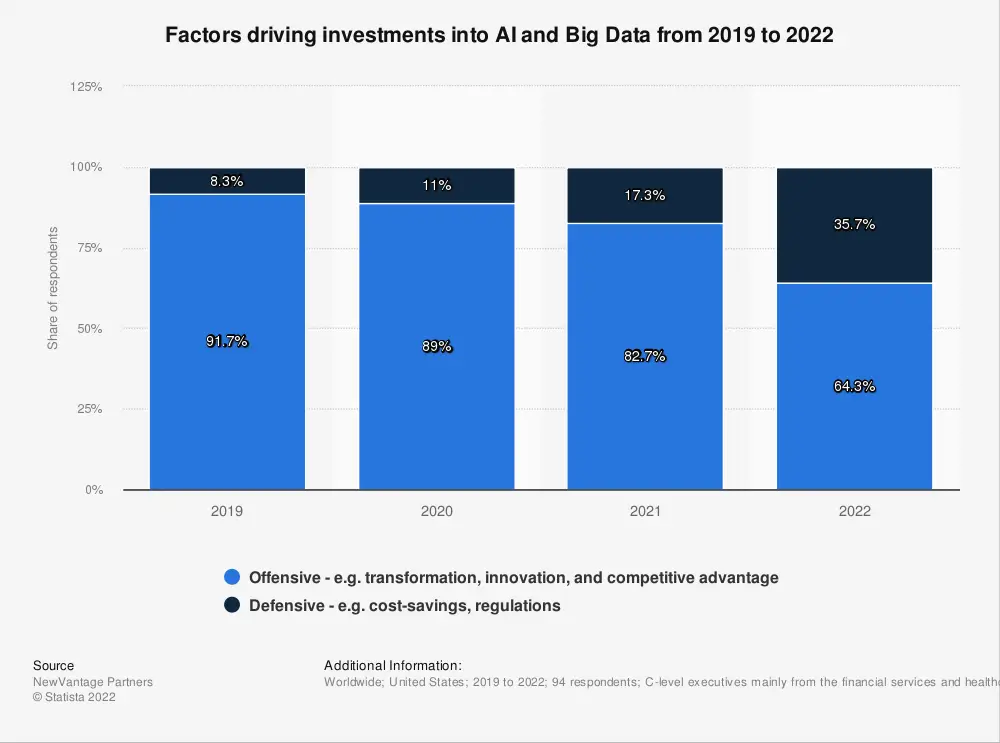Big data is a powerful tool that businesses can use to gain a deeper understanding of their customers, their products, and the market in which they operate.
By leveraging big data, businesses can make more informed decisions, optimize processes, and forecast future trends. Let’s take a look at how big data can be used to improve business operations.
Using Big Data For Optimization
Big data has the potential to help businesses optimize processes from top to bottom. Using large amounts of data collected from various sources, companies can measure and analyze customer behavior to identify areas for improvement.
This includes everything from creating personalized offers for customers based on their past purchases to optimizing supply chain management processes for greater efficiency and cost savings. With enough data points, businesses can create detailed models of customer behavior that can be used to predict future trends and outcomes.
Gathering Insight From Big Data
Another way businesses can use big data is by gathering insights on their customers’ buying habits and preferences. By analyzing customer spending patterns over time, companies are able to develop better products or services that are tailored specifically to their target audience. This helps them stay ahead of the competition while giving them a better understanding of what drives consumer demand in their industry.
Additionally, analyzing customer feedback through surveys or social media can give companies valuable insight into what customers think about their brand or product offering.
Utilizing Machine Learning & AI

Finally, big data also enables businesses to utilize machine learning and artificial intelligence (AI) technologies such as natural language processing (NLP) or predictive analytics tools.
These technologies enable companies to quickly process large amounts of data in order to find meaningful patterns or correlations among different sets of variables—allowing them to make more informed decisions in less time than ever before.
Furthermore, using machine learning algorithms allows companies to automate certain tasks such as marketing campaigns or customer service operations with minimal human intervention—increasing efficiency while reducing costs associated with labor-intensive processes.
How Big Data Can Help Businesses Improve Their Marketing Strategies
With the advent of big data, businesses now have access to more information about their customers than ever before. Having this data available can help businesses tailor their marketing strategies to meet their customers’ needs and preferences.
What Is Big Data?
Big Data is any large set of structured or unstructured data that can be analyzed to uncover patterns and trends. Businesses typically use Big Data to gain insights into their customers’ behavior so they can better understand the motivations behind their decisions.
This knowledge allows them to develop more effective marketing campaigns that target the right people with the right message.
Analyzing Customer Behavior Using Big Data
By analyzing customer behavior using Big Data, businesses are able to gain a better understanding of what appeals to their target audience and make informed decisions about which tactics are most likely to be successful.
For example, if you know that a certain demographic is more likely to respond positively to emails over text messages, you can tailor your campaigns accordingly and maximize your return on investment (ROI).
Similarly, if you know that certain age groups are more likely to purchase certain products, you can create targeted campaigns for those age groups in order to increase sales.
Using Big Data To Optimize Your Campaigns
Once you have identified which tactics work best for your target audience, you can use Big Data tools such as machine learning algorithms and artificial intelligence (AI) systems to optimize your campaigns in real-time.
These tools allow you to quickly analyze user feedback and adjust your messaging accordingly in order ensure maximum engagement with your target audience. By taking advantage of these technologies, businesses can quickly adapt their campaigns in response changing consumer behaviors and trends – something which was not possible before the advent of big data analytics solutions.
How Businesses Can Use Big Data To Improve Customer Service
Technology is becoming increasingly more advanced, and businesses are now able to leverage the power of big data in order to improve their customer service. By collecting, analyzing and utilizing large amounts of data, businesses can gain deeper insight into customer behavior and preferences.
This allows them to provide a more tailored approach to customer service that results in higher levels of satisfaction and loyalty. Let’s dive into how businesses can use big data to improve their customer service.
Data Collection and Analysis
The first step for any business looking to leverage big data for improved customer service is collecting useful data about their customers. This can include things such as demographics, purchase history, web browsing habits, etc.
Once the data has been collected it should be analyzed carefully so that patterns can be identified and trends spotted. Doing this will help businesses better understand what their customers want and need from them, as well as identify potential areas for improvement or expansion.
Customer Segmentation
Once businesses have collected and analyzed their customer data they can begin segmenting their customers into different groups based on shared characteristics or behaviors. This allows them to provide a more personalized experience for each segment based on what they know about them.
For example, if a business finds that one segment prefers certain types of products then they can target those customers with specific offers or discounts related to those products.
Additionally, this kind of segmentation helps ensure that the right message is being delivered at the right time which leads to better engagement rates with customers.
Personalized Experiences
By leveraging big data, businesses are also able to create customized experiences for each individual customer based on their past interactions with the company as well as their unique preferences and needs.
This includes everything from providing personalized product recommendations or offers based on past purchases to delivering targeted content via email or other channels that is tailored specifically for each individual user.
Doing this helps create a stronger relationship between customers and your brand which leads to increased loyalty over time.
What Are The Four Benefits Of Big Data?
Big data has become a buzzword in the business world, but what exactly is it and how can it help your business? Put simply, big data is a collection of large, interrelated datasets that can be analyzed and mined for information.
By taking advantage of this powerful tool, businesses are able to gain insight into customer behavior, market trends, and more. Let’s take a look at some of the key benefits of big data for businesses.
1) Increased Efficiency: Big data allows businesses to automate processes and streamline operations by identifying areas where they can save time and money. For example, using big data analytics to pinpoint areas of waste or identify bottlenecks in supply chains can help companies reduce their overhead costs while increasing revenue.
2) Enhanced Decision-Making: The insights gleaned from big data analysis provide companies with actionable intelligence that can be used to make better decisions. This could range from forecasting future demand for products or services to gaining a better understanding of customer preferences and needs. By leveraging the power of big data, companies are able to make smarter decisions that will lead to improved outcomes.
3) Improved Customer Experience: Companies that use big data are able to better understand their customers’ behaviors, needs, and preferences—which means they can create more tailored experiences for them. For instance, by analyzing customer purchasing patterns over time, companies are able to offer personalized recommendations or discounts based on past purchases. Additionally, this type of analysis can lead to improved customer loyalty as customers come back for more tailored experiences each time they shop with you.
4) Faster Response Times: With access to real-time insights provided by big data analysis, businesses are able to quickly respond to changing market conditions or customer demands. This helps them stay ahead of competitors by being the first ones out the gate with new products or services that meet their customers’ evolving needs.
Leveraging Big Data To Improve Business Performance
As businesses continue to become increasingly data-driven, the importance of leveraging big data to make better decisions and improve performance has become more and more evident.
By harnessing the power of big data, companies can gain a competitive edge in the market, cut costs, and increase efficiency. In this blog post, we will explore how businesses can use big data to their advantage.
The first step in using big data for business purposes is collecting and organizing it. To do this successfully, businesses need to have a comprehensive understanding of the types of data they need to collect and how it will be used.
It’s also important that they have an efficient system for storing and analyzing the data, this could include anything from basic spreadsheets to complex software solutions. Once the data is collected and organized properly, businesses can begin leveraging it for decision-making purposes.
One way in which businesses can leverage their data is by using predictive analytics. Predictive analytics involves using algorithms to analyze large amounts of historical data in order to predict future outcomes or trends.
This can be used for everything from marketing campaigns to product development, as well as forecasting sales figures or predicting customer behavior. Predictive analytics can help businesses identify potential problems before they arise, allowing them to make proactive decisions that can save time and money in the long run.
Another way businesses can utilize their data is through prescriptive analytics. Prescriptive analytics takes predictive analytics one step further by making recommendations based on the analysis of large amounts of historical data.
This type of analysis allows businesses to make informed decisions about how best to move forward with their strategies, such as which products should be developed or how marketing campaigns should be structured. By using prescriptive analytics, businesses are able to optimize their operations for maximum efficiency and success.
Conclusion
Big data is important for businesses because it can help them improve their marketing strategies, customer service, and more. By using big data, businesses can gain a competitive edge and better understand their customers.
References
https://en.wikipedia.org/wiki/Big_data
https://www.oracle.com/uk/big-data/what-is-big-data/
https://www.investopedia.com/terms/b/big-data.asp


